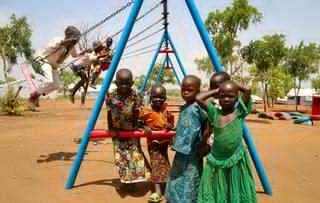Six-year-old Santo proudly wears a Harvard T-shirt as if he has just been accepted into the elite institution, but its warped lettering, layers of dirt and gaping holes say more about the young refugee’s future.
After fleeing South Sudan’s three-year civil war, Santo and his family have found themselves in the bleak Bidi Bidi settlement in northern Uganda, among hundreds of thousands of people who make up the world’s fastest-growing refugee crisis.
Santo’s father, Godfrey Moro, described desolate conditions for his son: no school, no electricity or running water, a shortage of food and little respite from the sweltering the sun.
As Moro spoke to The Associated Press, the young boy gnawed at his own hands to keep himself entertained.
“The war has affected these children in so many ways,” Moro said.
South Sudan is known for its “lost boys,” roughly 20,000 orphans who trekked across southern Sudan in the 1980s during the region’s struggle for independence. Three decades later, young Santo is part of another lost generation of children whose new nation, barely older than themselves, has been ripped apart by fighting.
As U.N. officials warn of ethnic cleansing, their data create a harrowing portrait of innocence lost: More than 200,000 children are at risk of death caused by a lack of food. More than 17,000 have been child soldiers for the government or various rebel groups. And U.N. officials say they are increasingly worried about children killing themselves in crowded U.N.-run displacement sites across South Sudan under grim conditions.
South Sudanese officials acknowledge the challenges.
“Schools are left in ruins, some occupied by warring forces, death of innocent people is rampant,” Michael Lopuke, an undersecretary at the ministry of education, said in an email.
Joyce and Florence are two teenage girls in the Bidi Bidi refugee settlement where more than 270,000 people have arrived since July, when fighting erupted again in South Sudan’s capital. Each girl lost her parents during ethnically targeted killings in September. Each found a welcoming foster family in Moro and his wife and children.
When asked why the adults had been fighting back home, Joyce struggled to explain the intricacies of a war that has upended her life. “I don’t know,” she said shyly.
The two girls are part of a growing population of children left orphaned by the civil war. Roughly 25 percent of the students in the Bidi Bidi settlement are orphans, according to Amanda David, a head teacher at one of the newly created schools. Many live with foster families.
The children study in a patchwork of oversized grey tents that serve as classrooms. There are more than 100 students per teacher, with no school materials, and many children don’t receive proper medical care or sanitation at home.
Still, the refugee children have a better chance at education than those left behind. Last year the U.N. said roughly 50 percent of children in South Sudan — or 1.8 million children — do not attend school, the highest delinquency rate in the world. Many teachers have not been paid for months.
South Sudan’s government says it is committed to ending the children’s misery. In August, President Salva Kiir said he has “sleepless nights and spent every moment of my day thinking about the South Sudanese child who is hungry in the village.”
But watchdog groups and others have pointed out that South Sudan’s government spends roughly 10 times the amount of money on its military than it does on education, according to the national budget. All sides in the civil war continue to use child soldiers, despite promises to stop it.
A U.N. report last year described how South Sudan’s military attacked schools and wrote of “children being ordered to kill civilians.” The U.N. verified 430 children across the country who had been victims of sexual violence by the South Sudanese military and added that “boys were reportedly castrated and sexually mutilated, while girls who resisted rape were killed.”
An internal U.N. report obtained by the AP describes how U.N. officials in March visited a school in the Jonglei area that had been commandeered by a local militia that included children. U.N. officials found “AK-47 rifles and RPGs were propped against the wall and next to the doorway of the classroom,” the report said.
Late last year, a group of children and young men ranging from 14 to 19 years old told the AP they had been kidnapped in the town of Mayom by government soldiers and forced to join the military.
One 14-year-old described how he escaped to a U.N. displacement camp.
“I want to tell Salva Kiir to stop recruiting young soldiers,” the boy said. “I want to join those in school.”
©AP



